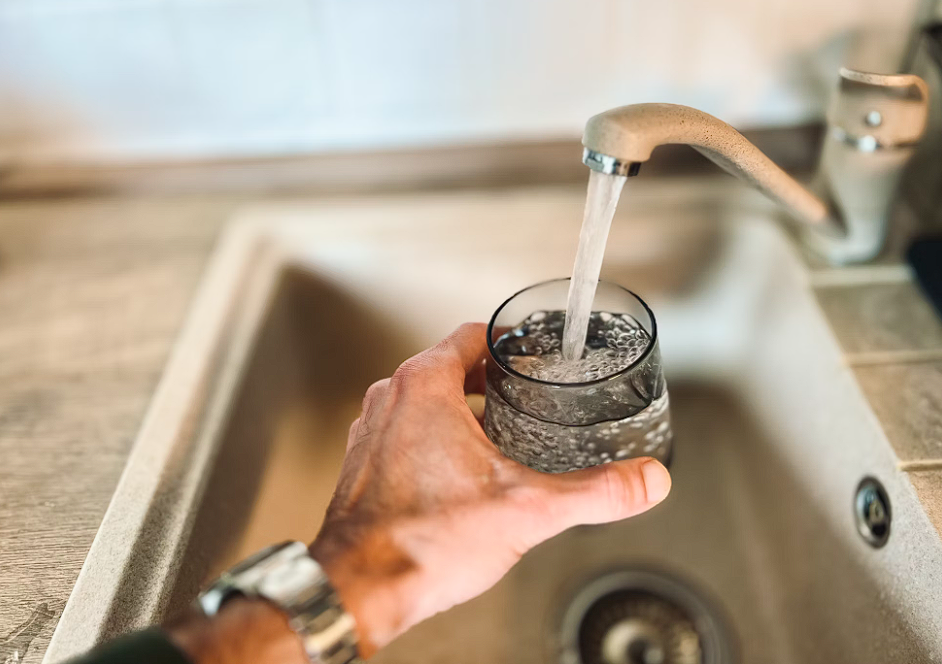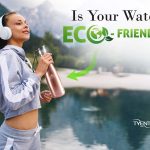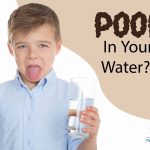Tap water—you use it to brush your teeth, wash your hands, do the dishes, and so much more. The convenience of tap water being only a turn of the faucet away is tough to beat. But, most people don’t know what’s in their tap water which begs the question: Is tap water safe to drink?
It’s valid to assume the answer is yes. After all, Americans enjoy one of the world’s safest supplies of drinking water, according to the U.S. Environmental Protection Agency (EPA). And, every public water system is required to meet the health-based standards set by the EPA’s Safe Drinking Water Act (SDWA).
However, you’ll be surprised to know tap water isn’t as healthy as you think.
Keep reading to find out why you should never drink water directly from the tap, what’s lurking in your tap water, and the importance of investing in one of the best water ionizers for your family’s health.
Is Tap Water Safe to Drink?
Your tap water is sourced from either surface water or groundwater and treated through your local water utility before flowing through your faucets.
The quality of your tap water hinges on the condition of the source water it’s drawn from and the treatment it receives. The EPA sets legal limits on over 90 contaminants in tap water, water-testing schedules, and specific methods that water utilities are required to follow.
Does this make tap water safe to drink?
Nope. Not even close.
A passing grade from the government doesn’t necessarily mean your tap water is safe. Yes, the EPA monitors for roughly 90 contaminants, but the Environmental Working Group’s tap water database notes there are over 320 lurking in tap water. This means hundreds of chemicals—many of which posing health risks—lack enforceable federal standards.
Contamination can happen due to faux pas related to manufacturing processes, sewer overflows, malfunctioning wastewater treatment systems, and improperly maintained pipes.
Hard Water vs. Soft Water
Water naturally contains a variety of minerals, such as calcium and magnesium—whether your water is considered “hard” or “soft” depends on the level of minerals it contains.
Hard water generally has higher levels of calcium and magnesium than soft water. Too much of which may lead to health problems, like diarrhea, kidney stones, and eczema flares. Hard water can contain other metals too, such as lead and aluminum—metals associated with brain and kidney damage.
So, is tap water safe to drink if you soften it first? Still no. Soft water can be just as problematic for your health. On the flip side, you risk getting too few minerals when you drink soft water. Soft water also tends to leach metals, like copper and lead, from plumbing fixtures.
To enjoy contaminant-free drinking water with well-balanced mineral levels, investing in a Tyent water ionizer is a must. Tyent offers a range of pre-filtration options to match your source water needs, including remineralization filters for people who use water softeners and reverse osmosis units.
This Tyent water ionizer review will help you pick the best model for your lifestyle!
What Are the Risks With Drinking Polluted Tap Water?
Drinking contaminated tap water can cause a variety of mild to severe health issues, from gastrointestinal distress to chronic diseases. Symptoms depend on the type and concentration of chemical or germ in the water, how much you consume, and how long you’re exposed.
Chemical exposures, such as metals, pesticides, and pharmaceuticals, can lead to severe health issues, like nervous system and organ damage, even cancer. Meanwhile, exposure to bacteria, viruses, and parasites can result in stomach pain, vomiting, diarrhea, headache, fever, and kidney problems. Infectious diseases, like hepatitis, can also strike.
Tap Water Safety Tips
If you’re concerned about the safety of your tap water, here’s how to make sure your H2O is as safe as possible.
1 Check local water quality reports
Look up your area’s Consumer Confidence Report (CCR), an annual report every community water supplier is required to provide its customers by July 1st of each year.
The report lists any contaminants found in your tap water and their levels at the time of testing. If your water supply has high levels of contaminants, your water utility is required to explain how the contaminants affect your health and what they’re doing to address the problem.
You can find this report online by using the EPA’s Find Your Local CCR search function. You should also check out the EWG’s Tap Water Database for a snapshot of any unregulated contaminants that might be lurking in your tap water.
2. Test your water
Sure, you can spend hundreds of dollars getting your water tested through a state-certified water lab—or you can contact Tyent to find out what’s in your water for free. (This is not a drill.)
Tyent has water quality data for every major municipality in the country, and they can give you the contents of your tap water within hours. No water sample required.
Get in touch for your free water report now!
3, Get a water filtration system
A water filtration system will remove or reduce the myriad chemicals and germs that are contaminating your tap water right now—most of which aren’t regulated by the EPA.
As far as the best alkaline water filter systems go, Tyent can’t be beat. Tyent’s NSF-certified filters remove over 200 dangerous contaminants, including heavy metals, pharmaceuticals, and 100% of lead in your tap water.
Unlike reverse osmosis filtration, which is incapable of differentiating between the good and bad in your tap water, Tyent filters only remove the bad while leaving essential minerals intact and bioavailable.
Order a Tyent water ionizer today!
4. Avoid placing your mouth on the spouts
The mouth hosts over 700 species of microorganisms, including bacteria, fungi, and viruses. When you place your mouth on the spouts (or touch the rim of your water bottle to them), the germs from your mouth transfer to the spouts and then leach into the water that’s dispensed from them later.
5. Routinely clean your water drinking area
In addition to producing antioxidant-rich alkaline and hydrogen water, Tyent water ionizers produce Turbo Water—water that’s too acidic to drink, but can be used as a super-effective non-toxic cleaner. Use straight-up to deep clean your water drinking area, water bottles, drinking glasses, and more.
As for cleaning your ionizer itself, Tyent water ionizers not only feature automatic and manual cleaning options, but let you know when it’s time to replace your filters.
Benefits of Filtered Water
The benefits of making filtered water a regular part of your life are too important to ignore. Let’s explore each perk in more detail.
Removes Contaminants
Drinking filtered water can significantly reduce your exposure to contaminants and the health problems they can cause.
Tyent water is the cleanest and healthiest in the world (their third-party test results prove it). Tyent’s line of water ionizers are fully equipped with a dual 0.01 micron filtration system—the same type of filtration that’s used in kidney dialysis machines.
The result? Over 200 dangerous contaminants are removed from your tap water, including heavy metals, pharmaceuticals, and 100% of lead.
Boosts Hydration
Molecular hydrogen is a super-antioxidant—the smallest and lightest in the world. When molecular hydrogen is dissolved in water, the water becomes turbo-charged hydration for your body.
Fortunately, you don’t have to find out where to buy hydrogen water to step up your hydration: Tyent water ionizers double as the best hydrogen water machines available.
The more molecular hydrogen your water is infused with, the greater the potential health benefits. Tyent’s UCE-13 Plus, ACE-13, and H2 Hybrid models feature a molecular hydrogen booster, allowing you to produce up to 1.8 ppm of hydrogen molecules and -1,250 ORP—the equivalent to 360% of the therapeutic concentration dose!
Enhances Taste and Odor
Filtered water tastes, smells, and looks better. As a result, you’ll likely drink more water and stay hydrated without it feeling like a chore. Tyent water, in particular, has a pure, clean, refreshing taste—so much so, you’ll never go back to how you were drinking water before.
Improves Overall Health
The benefits of hydrogen water are practically endless. Hydrogen is the smallest molecule in the universe and can penetrate every part of the human body, including the blood-brain barrier and mitochondria of each cell.
What might this mean for your health? Drinking hydrogen-rich alkaline water from a Tyent water ionizer can help:
- Increase your energy levels
- Boost your immune system
- Fight against free radicals
- Banish brain fog
- Accelerate fat loss
- Speed up recovery after exercise
- Improve your skin
- Promote better sleep
And all at the touch of a button!
Learn More About Tap Water Safety
The more you learn about tap water safety now, the less you’ll have to worry about contaminated water cramping your style later.
Is it safe to drink water from the tap?
It’s not safe to drink water from the tap. The U.S. Environmental Protection Agency does keep tabs on roughly 90 contaminants, but there are over 320 lurking in tap water. That’s hundreds of health-sabotaging chemicals going unsupervised in the water supply.
Filtering your water first is paramount to keeping your health in check, and Tyent water ionizers make the process super-easy. Find out exactly what’s in your water by ordering Tyent’s free water quality report, then order the precise pre-filters necessary to deep-clean your source water.
What should you avoid in tap water?
There are many chemicals and germs that can make you sick if they’re in your tap water at unsafe levels. Some cause illness right away, while others endanger your health over time the longer you’re exposed.
The most common chemicals and germs to avoid in tap water include:
- Arsenic
- Copper
- E. coli O157
- Enterovirus
- Giardia
- Hepatitis A
- Lead
- Legionella
- Nitrate
- Norovirus
- Radon
- Rotavirus
- Salmonella
Investing in an advanced water filtration system is the smartest way to avoid these contaminants. Tyent water ionizers take minutes to install and feature a dual Dialipure 0.01 micron filtration system that removes over 200 dangerous contaminants from your tap water.
They also have a range of pre-filtration options so you can use the appropriate filters for the specific contents of your water. Request a free water quality report to find out which ones are the best fit.
What does “safe” drinking water mean?
The World Health Organization deems drinking water as “safe” if it doesn’t represent any significant risk to a person’s health over a lifetime of consumption, including different sensitivities that may strike between life stages.
According to the Environmental Working Group, however, many of the 324 contaminants detected by local utilities’ tests are found at levels that may be legal under the EPA’s standards or state regulations, but far exceed levels scientific studies have found to pose health risks.
To keep you and your family safe from the health risks of contaminated water, investing in an advanced water filtration system—like those found in Tyent water ionizers—isn’t a luxury, but a necessity.
The Bottom Line: Is Tap Water Safe?
Is tap water safe to drink as-is? Only if the tap you’re pouring it from is attached to a Tyent water ionizer. Tyent water ionizers transform your tap water into clean, safe, and great-tasting H2O that’s packed with natural-occurring antioxidants to support good health.
Ready to find out what’s in your water? Order your free water quality report today!



![What is Electrolyzed Water? [2024 Guide] water spray](https://www.tyentusa.com/blog/wp-content/uploads/2024/10/Screenshot-2024-10-22-104012-150x150.png)





